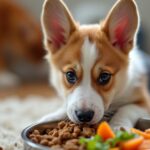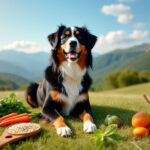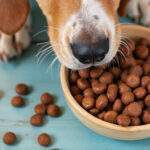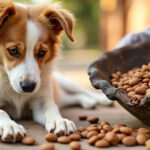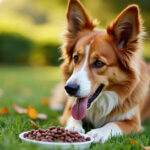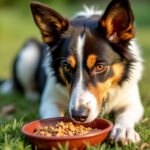Bernese Mountain Dogs thrive on a well-balanced diet that supports their health and energy. Their nutritional needs include high-quality protein, managed fat content, and the right balance of calcium and phosphorus. Choosing the ideal food for Berners means considering their specific requirements at each life stage, from puppy to senior, with options ranging from premium dry food to raw and fresh diets.
Table of Contents
ToggleKey Takeaways:
- Pick dog foods with whole meat as the primary ingredient, containing 18-26% protein from animal sources.
- Limit fat content to under 16% to avoid weight gain and digestive problems in Bernese Mountain Dogs.
- Focus on age-specific nutrition, with distinct options for puppies, adults, and senior Berners.
- Raw and fresh food diets can boost digestion and energy levels.
- Add supplements like antioxidants, B-complex vitamins, and joint support to improve overall health.
Understanding Bernese Mountain Dogs’ Nutritional Needs
Key Nutritional Components
Bernese Mountain Dogs require a carefully balanced diet to maintain their health and vitality. I’ve identified several crucial elements that should be present in their food:
Protein is essential, with 18-26% coming from animal sources like meat, poultry, and fish. This helps maintain muscle mass and supports overall growth.
Fat content should be kept under 16% to prevent weight gain and digestive issues. Bernese Mountain Dogs can be prone to obesity, so monitoring fat intake is critical.
For puppies, calcium and phosphorus are vital nutrients. They play a significant role in preventing joint issues, which this breed can be susceptible to.
Fiber and digestibility are important factors, especially for Bernese Mountain Dogs with sensitive stomachs. These elements can help prevent bloat, a potentially dangerous condition for large breeds.
When selecting food for your Bernese Mountain Dog, look for options that:
- Contain high-quality animal proteins
- Have controlled fat content
- Include appropriate levels of calcium and phosphorus (especially for puppies)
- Offer easily digestible ingredients and adequate fiber
By focusing on these nutritional aspects, you’ll be providing your Bernese Mountain Dog with a diet that supports their specific needs and helps maintain their health for years to come.
Choosing the Right Ingredients for Your Berner
Whole Food Ingredients
I recommend focusing on dog foods that list whole meat as the first ingredient for your Bernese Mountain Dog. This ensures your Berner gets high-quality protein essential for maintaining their muscular build and overall health. Look for options featuring lamb, fish, or turkey as primary protein sources.
Allergen Considerations
Berners can be sensitive to certain ingredients. It’s best to avoid common allergens like:
- Corn
- Wheat
- Chicken
- Beef
Instead, opt for alternative protein sources and carbohydrates that are gentler on your dog’s digestive system.
When it comes to grains, you’ve got choices. Grain-free diets can benefit dogs with specific sensitivities, while grain-inclusive options provide valuable nutrients and fiber. Consider your Berner’s individual needs and consult with your vet to determine the best approach.
If you choose a grain-inclusive diet, look for wholesome grains like brown rice or oatmeal. For grain-free options, seek out foods with nutritious alternatives such as sweet potatoes or lentils.
Remember, the key is selecting a balanced diet with high-quality, easily digestible ingredients that support your Bernese Mountain Dog’s health and vitality.
Top Dog Food Picks for Bernese Mountain Dogs
Age-Specific Nutrition
I’ve identified top dog food options for Bernese Mountain Dogs at different life stages. For puppies, Nutro Ultra Large Breed Puppy High Protein is an excellent choice, offering 29% protein and 16% fat to support growth. Adult Bernese Mountain Dogs thrive on Blue Buffalo Wilderness Rocky Mountain Dog Food, with its high 34% protein content. Dogs with digestive issues benefit from Royal Canin Gastrointestinal Dry Adult Dog Food, which provides a balanced 23% protein and 15% fat. For senior dogs, Hill’s Science Diet Adult 6+ is ideal, featuring 17% protein and 12% fat to maintain health in older years. These options cater to the specific nutritional needs of Bernese Mountain Dogs throughout their lives, ensuring they stay healthy and active.
Raw and Fresh Food Options for Berners
Top Raw and Fresh Choices
Instinct Raw Frozen Bites offer a protein-packed option for Bernese Mountain Dogs. With 40% protein, 46% fat, and 18% fiber, it’s a nutrient-dense choice. Raised Right Dog Food provides a human-grade alternative, focusing on low carb and high protein content. Both options cater to the nutritional needs of Berners.
Benefits of Raw and Fresh Diets
Raw and fresh food diets can provide several advantages for Bernese Mountain Dogs:
- Improved digestion
- Shinier coat and healthier skin
- Increased energy levels
- Better weight management
I’ve found that many Berner owners report positive changes after switching to raw or fresh diets. However, it’s crucial to consult with a vet before making significant dietary changes, ensuring your dog’s specific needs are met.
Supplements and Feeding Guidelines
Essential Supplements
I recommend adding key supplements to your Bernese Mountain Dog’s diet for optimal health. These include antioxidants to boost immunity, B-complex vitamins for energy, omega-3 and 6 fatty acids for coat health, and joint support supplements to maintain mobility. These additions can significantly improve your dog’s overall well-being.
Feeding Schedule and Portions
For Bernese Mountain Dog puppies, I suggest 3-4 meals per day, while adults do well with 2 daily meals. Adult Bernese Mountain Dogs typically need 3-6 cups of food daily, adjusted based on their activity level. It’s crucial to monitor your dog’s weight and adjust portions accordingly to maintain a healthy physique.
Special Considerations for Bernese Mountain Dogs
Large Breed Health Concerns
Bernese Mountain Dogs need food that supports their size and unique needs. I recommend focusing on joint health and bloat prevention. Look for foods with glucosamine and chondroitin to protect their joints. To reduce bloat risk, choose kibble that encourages slower eating.
Digestive and Weight Management
These gentle giants often have sensitive stomachs. Opt for highly digestible formulas with quality protein sources. For weight management, select foods with moderate fat content. Here are key factors to consider:
- Easily digestible ingredients
- Balanced protein-to-fat ratio
- Portion control guidelines
By addressing these specific needs, you’ll help your Bernese Mountain Dog thrive. Remember, the right food can make a big difference in their overall health and happiness.
Sources:
Dogster
Rover
BMD Info
Wag Walking
Here is the FAQs section in HTML format based on the article text:
Frequently Asked Questions
How much protein should a Bernese Mountain Dog’s diet contain?
Bernese Mountain Dogs require 18-26% protein in their diet, preferably from animal sources like meat, poultry, and fish.
What fat content is recommended for Bernese Mountain Dogs?
Fat content should be kept under 16% to prevent weight gain and digestive issues, as Bernese Mountain Dogs can be prone to obesity.
Are grain-free diets necessary for Bernese Mountain Dogs?
Grain-free diets can benefit dogs with specific sensitivities, but grain-inclusive options also provide valuable nutrients and fiber. Consult with your vet to determine the best approach for your dog.
What are some recommended dog food brands for Bernese Mountain Dogs?
Some top picks include Nutro Ultra Large Breed Puppy High Protein for puppies, Blue Buffalo Wilderness Rocky Mountain Dog Food for adults, and Hill’s Science Diet Adult 6+ for senior dogs.
Are raw or fresh food diets beneficial for Bernese Mountain Dogs?
Raw and fresh food diets can provide benefits such as improved digestion, shinier coat, and better weight management. However, consult with a vet before making significant dietary changes.
How often should I feed my adult Bernese Mountain Dog?
Adult Bernese Mountain Dogs typically do well with 2 daily meals, consuming about 3-6 cups of food per day, adjusted based on their activity level.
What supplements are recommended for Bernese Mountain Dogs?
Key supplements include antioxidants, B-complex vitamins, omega-3 and 6 fatty acids, and joint support supplements to maintain overall health and mobility.
How can I prevent bloat in my Bernese Mountain Dog?
To reduce bloat risk, choose kibble that encourages slower eating and follow proper feeding guidelines. Consult with your vet for additional preventive measures.
